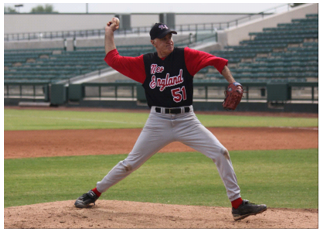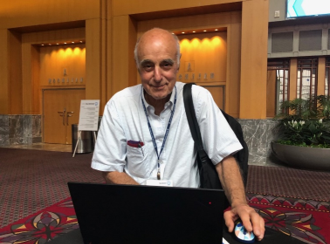IN MEMORY OF HAL LEVIN
Hal Levin, a pioneer and leader in the field of indoor air quality and building ecology, died in Laveno, Italy on February 21, 2023.
Hal was born in Portland, Oregon on October 6, 1941, the son of Mollie Schnitzer Levin and Bernard Levin. After his father returned from World War II, the family moved to Beverly Hills, California. Hal’s lifelong love of baseball began there, as he played from Little League through high school. He attended Cornell University before transferring to the University of California at Berkeley, pitching on both baseball teams. He continued to pitch throughout his life and pitched in senior leagues until he was seventy-seven years old.
A video tribute of Hal's life can be viewed here.

Hal was a volunteer architect in the Peace Corps in Colombia from 1966-1968. After returning from the Peace Corps, he graduated from Cal with degrees in architecture and English. For the next several years, he worked at the Organization for Social and Technological Innovation and Building Systems Development, working on affordable and sustainable housing. Hal moved to Boulder Creek, California in 1973 and built houses. He was a Research Specialist at the College of Environmental Design at UC Berkeley where he taught budding architects about the need to understand the realities of constructing the things that they designed. In 1972, he founded the Building Ecology Research Group.
In 1977, then Governor Jerry Brown appointed Hal as a consumer member of the California State Board of Architectural Examiners, a position he held until 1985,and was President of the Board in 1983 and 1984. As a member of the Board, he held hearings on “sick building syndrome”. These hearings ignited his interest in indoor air quality and the ecology of buildings. He was early to recognize the need for and value of examining the toxicity of building materials and systems used in their construction and operation. His work focused on the integration of knowledge about indoor and outdoor air pollution as week as other risk factors into the design, construction, and operation of residential and commercial buildings and communities. .
Hal was the President of the Indoor Air Institute and a Principal in Building Ecology Research Group. He was a prolific author on the subject of indoor air quality. He was engaged by many institutions as a lecturer, research scientist, architect, and consultant throughout the world. These included Lawrence Berkeley National Lab, UC Davis, the University of California, the State of California, the National Institutes of Health, the World Health Organization, and the U.S. Environmental Protection Agency. He lectured extensively all over the world and taught at UC Berkeley, UC Santa Cruz and Harvard University. Hal was a member of many organizations, including the American Society for Heating, Refrigerating, and Air-Conditioning Engineers (ASHRAE) which gave him its distinguished service award, American Society for Testing and Materials (ASTM), which gave him its Award of Merit, and the International Society of Indoor Air Sciences. Hal was the President of Indoor Air 2002, organizing the Ninth International Conference on Indoor Air Quality and Climate, held in Monterey, California in 2002.
Hal’s influence in the field was profound. Part of his genius lay in his recognition that there is always more to learn and do, the result of which is the extent to which he pressed himself and others to make buildings as healthy as possible. His innate humility made it possible for him to help his students and colleagues find both voice and encouragement where it had been absent. As one colleague said, “He made me a better person.” Similar reflections like “a better researcher;” “a better professional” “a better carpenter” are a few of the expressions from his many friends and colleagues.

Having developed an interest in South American music while in the Peace Corps, Hal hosted a show on Santa Cruz public radio station KUSP for eighteen years.
In 2003, Hal met the love of his life, Mariachiara Tallacchini—a law professor and ethicist-- in Milan, Italy. They were married in 2004 and shared a bicontinental marriage for the next fifteen years. In 2019, he concluded that it was time to retire and, with their dog, Aki, move to Reno di Leggiuno, Italy, by Lake Maggiore so that he could be with Mariachiara full time. Sadly, Hal was diagnosed with Parkinson’s Disease in April 2020, and his health declined rapidly.
In addition to his wife, Hal is survived by his sisters, Ellen Jacobs (Martin) and Nancy Levin (Daniel Caraco); his nephews Joel Jacobs (Denise Wolf) and Joshua Caraco; his niece Margie Jacobs (Andrew Seplow); great-nieces and cousins; and Aki. Hal’s parents and his nephew Benjamin Caraco predeceased him.
The family requests that donations in Hal’s memory be made to the Ben Caraco/Scott Stapleton Scholarship Fund at The College Preparatory School in Oakland, California, the Michael J. Fox Foundation for Parkinson’s Research, or the Natural Resources Defense Council.